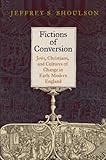Fictions of Conversion : Jews, Christians, and Cultures of Change in Early Modern England / Jeffrey S. Shoulson.
Material type: TextPublisher: Philadelphia : University of Pennsylvania Press, [2013]Copyright date: ©2013Description: 1 online resource (280 p.)Content type:
TextPublisher: Philadelphia : University of Pennsylvania Press, [2013]Copyright date: ©2013Description: 1 online resource (280 p.)Content type: - 9780812244823
- 9780812208191
- American poetry
- Christianity and other religions -- Judaism -- History -- 17th century
- English literature -- Early modern, 1500-1700 -- History and criticism
- Jews in literature -- History and criticism
- Religion and literature -- England -- History -- 17th century
- Religious Studies
- LITERARY CRITICISM / European / English, Irish, Scottish, Welsh
- Cultural Studies
- Literature
- Medieval and Renaissance Studies
- Religion
- Religious Studies
- 811/.54 19
- PS3505.O763 R4 1981
- online - DeGruyter
- Issued also in print.
| Item type | Current library | Call number | URL | Status | Notes | Barcode | |
|---|---|---|---|---|---|---|---|
 eBook
eBook
|
Biblioteca "Angelicum" Pont. Univ. S.Tommaso d'Aquino Nuvola online | online - DeGruyter (Browse shelf(Opens below)) | Online access | Not for loan (Accesso limitato) | Accesso per gli utenti autorizzati / Access for authorized users | (dgr)9780812208191 |
Browsing Biblioteca "Angelicum" Pont. Univ. S.Tommaso d'Aquino shelves, Shelving location: Nuvola online Close shelf browser (Hides shelf browser)

|

|

|

|

|

|

|
||
| online - DeGruyter Bound to Read : Compilations, Collections, and the Making of Renaissance Literature / | online - DeGruyter Representation : Elections and Beyond / | online - DeGruyter Multilevel Citizenship / | online - DeGruyter Fictions of Conversion : Jews, Christians, and Cultures of Change in Early Modern England / | online - DeGruyter Locked In, Locked Out : Gated Communities in a Puerto Rican City / | online - DeGruyter Violence in Roman Egypt : A Study in Legal Interpretation / | online - DeGruyter Of Bondage : Debt, Property, and Personhood in Early Modern England / |
Frontmatter -- Contents -- Introduction -- Chapter 1. "The Jews Perverted and the Gentiles Converted": Confessions and Conversos -- Chapter 2. "Thy People Shall Be My People": Typology, Gender, and Biblical Converts -- Chapter 3. "The Meaning, Not the Name I Call": Converting the Bible and Homer -- Chapter 4. Alchemies of Conversion: Shakespeare, Jonson, Vaughan, and the Science of Jewish Transmutation -- Chapter 5. Conversion and Enthusiasm: Radical Religion and the Poetics of Paradise Regained -- Notes -- Bibliography -- Index -- Acknowledgments
restricted access online access with authorization star
http://purl.org/coar/access_right/c_16ec
The fraught history of England's Long Reformation is a convoluted if familiar story: in the space of twenty-five years, England changed religious identity three times. In 1534 England broke from the papacy with the Act of Supremacy that made Henry VIII head of the church; nineteen years later the act was overturned by his daughter Mary, only to be reinstated at the ascension of her half-sister Elizabeth. Buffeted by political and confessional cross-currents, the English discovered that conversion was by no means a finite, discrete process. In Fictions of Conversion, Jeffrey S. Shoulson argues that the vagaries of religious conversion were more readily negotiated when they were projected onto an alien identity-one of which the potential for transformation offered both promise and peril but which could be kept distinct from the emerging identity of Englishness: the Jew.Early modern Englishmen and -women would have recognized an uncannily familiar religious chameleon in the figure of the Jewish converso, whose economic, social, and political circumstances required religious conversion, conformity, or counterfeiting. Shoulson explores this distinctly English interest in the Jews who had been exiled from their midst nearly three hundred years earlier, contending that while Jews held out the tantalizing possibility of redemption through conversion, the trajectory of falling in and out of divine favor could be seen to anticipate the more recent trajectory of England's uncertain path of reformation. In translations such as the King James Bible and Chapman's Homer, dramas by Marlowe, Shakespeare, and Jonson, and poetry by Donne, Vaughan, and Milton, conversion appears as a cypher for and catalyst of other transformations-translation, alchemy, and the suspect religious enthusiasm of the convert-that preoccupy early modern English cultures of change.
Issued also in print.
Mode of access: Internet via World Wide Web.
In English.
Description based on online resource; title from PDF title page (publisher's Web site, viewed 24. Apr 2022)


